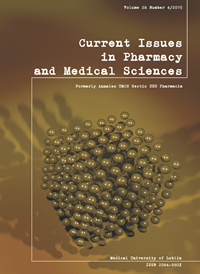Antimicrobial activity of petroleum ether and methanolic extracts from fruits of Seseli devenyense Simonk. and the herb of Peucedanum luxurians Tamam.
DOI:
https://doi.org/10.1515/cipms-2015-0084Keywords:
coumarins, antimicrobial, Peucedanum luxurians, Seseli devenyense, StaphylococcusAbstract
Plants of the Apiaceae family usually contain coumarins. These are used worldwide in traditional medicine, as well as in modern therapeutics. The aim of our study was to determine the antimicrobial activity of four extracts (methanolic and petroleum ether extracts) obtained from two Apiaceae species: Seseli devenyense (fruits) and Peucedanum luxurians (herb).
The activity of the investigated extracts was tested against 7 strains of Gram+ bacteria, and 7 strains of Gram-, as well as three of yeast. The results of this show that the best activity of such extracts (specifically, by way of petroleum ether) was seen as being against Staphylococcus aureus strains.
References
1. Chen B., Wang M., Liu J.: Chemical constituents of the volatile oil from the roots of Peucedanum praeruptorum and antibacterial activity. Redai Yaredai Zhiwu Xuebao, 10, 2002, 366
2. Dioskurides (2002). De Materia Medica. Codex Neapolitanus Graecus of National Library of Naples. Athens. Militos Press,pp. 215-216
3. Jovanovic O. P., Zlatkovic B. K., Simonovic S. R., Djordjevic A. S., Palic I. R., Stojanovic G. S.: Chemical composition and antibacterial activity essential oils isolated from leaves and fruits of Peucedanum austriacum (Jacq.) W.D.J. Koch. JEOR 25, 129, 2013
4. Murray R.D.H. (2002). Progress in the Chemistry of Organic Natural Products. Herz W., Falk H., Kirby G.W., Moore R.E. (editors). Wien, vol. 83, pp. 1-529
5. Ozturk S.Ercisli S.: Chemical composition and in vivo antibacterial activity of Seseli libanotis. World J Microb. Biotechn., 22, 261, 2006.
6. Skalicka-Woźniak K., Los R., Głowniak K., Malm A.: Antimicrobial activity of fatty acids from fruits of Peucedanum cervaria and P. alsaticum. Chem Biodiv, 7, 2748, 2010
7. Smyth T., Ramachandran V.N., Smyth W.F.: A study of antimicrobial activity of selected naturally occuring and synthetic coumarins. Int J Antimicrob Agents, 33, 421, 2009.
Downloads
Published
Issue
Section
License
Copyright (c) 2015 Authors

This work is licensed under a Creative Commons Attribution-NonCommercial-NoDerivatives 3.0 Unported License.


